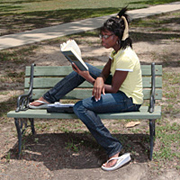College and University Education News

Computer Scientists Commemorate Pioneer
Although he would be 100 on June 23 if alive, Alan Turing is still the object of much admiration in the technology industry by those with a computer science degree or online computer science degree. The legacy of the father of computer science is still felt in numerous ways in the world.
As deputy director of Manchester University's Computing Laboratory, Turing contributed much innovation to artificial intelligence. One of his contributions that is still used today is the Turing Test, which was first published in 1950 in his paper "Computing, Machinery & Intelligence."
"If, during text-based conversation, a machine is indistinguishable from a human, then it could be said to be 'thinking' and, therefore, could be attributed with intelligence," he said in the paper.
Rick Rashid, chief research officer at Microsoft Research, recently told Wired that "the whole field of computing owes a huge debt to him."
"What was really trying to be captured by Turing I think was the notion that says, 'Can we build a computing system that does some specific function that human beings do, as well as a human being does it, or at least in a way that’s indistinguishable from a human being?'" he said. "In many areas now we’re able to do that, such as with chess or question-and-answer tasks, or other kinds of analysis. So we’re making progress, but that doesn’t mean we’re making intelligent machines. It means we’re able to do things that traditionally we thought only humans could do."
Computer scientists will have a bigger chance to design those intelligent systems in the future, as the U.S. Bureau of Labor Statistics said the computer science industry job outlook will grow by about 19 percent from 2010 to 2020.
Through tech giants like Microsoft and Google, computer scientists can influence a number of industries, from science and medicine to business and applications not even thought of yet. Rashid told Wired that if he were around today, he would have great insight into theoretical computer science and how to apply it to fields like statistical physics.
"I think if we give kids a chance to learn what computing is, and we do that early enough, I think we do give them an opportunity to at least have a desire to get to that point," he said. "I think one of the problems in our educational system is that we tend to push computing towards the end of the educational system - the end of high school or college - but 6-, 7- and 8-year-olds are perfectly capable of understanding basic concepts of computing, and even the basic concepts of something like a Turing machine."

